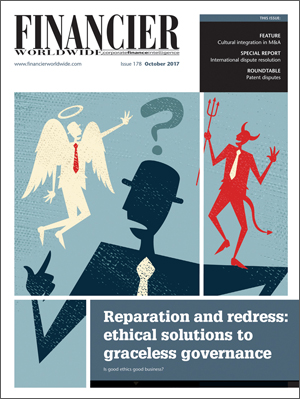Private investments and PE skyrocket in 2017
October 2017 | FEATURE | PRIVATE EQUITY
Financier Worldwide Magazine
Despite persistent uncertainty in the global economy, the private equity (PE) industry has performed well in 2017 to date. Though there has been speculation that deal activity may slow down as fund managers taking a cautious approach toward fresh funding, the value of PE investment in the year to date has continued to rise, according to Grant Thornton, particularly in certain jurisdictions, such as India and Africa. Indeed, H1 2017 saw PE and venture capital (VC) investments in India exceed $11.2bn, up from around $8bn year on year. The Indian economy saw notable investment activity in the financial services sector, as well as the technology, real estate, telecoms and e-commerce industries.
PE deal activity in the US was also up, year on year over the same period, reaching $99.1bn, an increase of 24.5 percent, according to White & Case. The PE industry has become, over the last 12 months, a notable sellers market; as such, the level of deal activity recorded in H1 2017 has been impressive. In the pharmaceutical industry, for example, the Carlyle Group and Hellman & Friedman sold Pharmaceutical Product Development to sovereign wealth funds GIC and ADIA for $9bn in the largest exit of the year so far.
Fundraising
There has been no slowdown in PE fundraising during the first half of the year. Momentum gathered in 2016 has continued. Capital commitments are on pace to surpass $220bn in 2017, with half of all cash committed to $5bn-plus mega funds, according to Pitchbook.
Europe-focused PE funds, including VC, mezzanine, secondaries and co-investments strategies, raised $67.13bn in the first half of the year, the strongest overall half year performance since 2008, according to Dow Jones LP Source. In Europe, Apax Partners, Astorg Partners and Cinven all closed significant funds, with Apax and Cinven accounting for $15bn worth of commitments. European VC funds have achieved closes worth $5.4bn across 45 funds, up year on year from $3.38bn raised across 47 funds. Furthermore, CVC Capital Partners has raised $17.98bn for its seventh fund for investments in Europe and North America. Undoubtedly, there is still strong demand among institutional investors looking for healthy returns and to date PE has been able to meet that demand. North America remains the most popular geographical focus for funds raised in the first half, accounting for 59 percent of the total.
“Given the level of capital being committed, the sheer number of firms in the market currently and the performance of many funds, the PE industry is experiencing a period of remarkable growth. ”
Despite the re-emergence of mega funds in recent years, the volume of fundraising has remained impressively consistent. Though some mega funds, like CVC VII, have completed huge closes, a number of other mega funds are still targeting, and will likely achieve, large scale commitments in 2017. Apollo Global Management’s Apollo Investment Fund IX is targeting $23.5bn, Oaktree Capital Management is targeting $7bn for its latest fund and Blackstone’s GSO Capital Solutions Fund III is targeting $6.5bn.
The four largest publicly traded PE firms, Blackstone, KKR, The Carlyle Group and Apollo Global Management, also reported a total $921bn in assets under management in Q2 2017, a 6.5 percent increase over the prior quarter.
Dry powder
Given the increased levels of PE fundraising in recent years, and the difficulties many organisations have faced in putting capital to work, it is unsurprising that record levels of dry powder have amassed in the PE space.
With around $1.5 trillion waiting in the wings and an abundance of cheap financing still available to firms, it is surprising that more deals have not been concluded. However, given that the PE space is currently marked by high and rising prices and increased competition for assets, it is harder for firms to complete transactions.
Reaping the rewards
Given the level of capital being committed, the sheer number of firms in the market currently and the performance of many funds, the PE industry is experiencing a period of remarkable growth. Firms are outperforming public equities, fixed income and real estate, and given the poor performance of hedge funds, investors are directing more capital toward the PE sector as they hunt for higher yields. According to Preqin, 95 percent of PE investors are satisfied with the performance of the asset class.
Maintaining the level of growth in the industry, as well as the satisfaction felt by investors, will be a challenge for PE firms, particularly given the level of competition in the market. Differentiating from the competition and getting deals completed will present additional tests. As LPs continue to seek greater returns, many have begun to work with, and invest in, a smaller number of firms which will allow them to reduce their internal operating costs, as well as simplify their compliance and performance reporting.
The PE industry is awash with capital. More funds are entering the market and commitments continue to increase. With increased competition, and fewer opportunities for firms to put their cash to work, fund managers must find new ways to increase returns to investors. Be it through improving internal functions or by entering new markets, they must strive for new ways of generating value for LPs.
© Financier Worldwide
BY
Richard Summerfield

